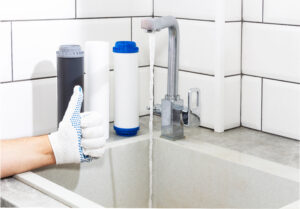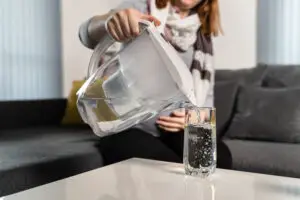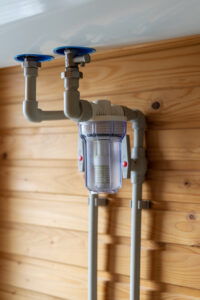The Best Filtration System for Your Water
There are numerous health benefits to drinking water. It keeps you hydrated, regulates your body temperature, helps you lose weight – you name it. And it gets even better since you do not have to go to a store to buy it. You have your own source of the best drink at hand
Where?
In the kitchen, of course.
However, tap water quality is not the same everywhere. Heavy metals, chlorine, or other harmful contaminants lead to low water quality and can negatively affect your health. You can always resort to bottled water, but it is neither fresh nor cheap in the long run.
Luckily, with the invention of water filtration systems, you can have pure, clean water at your disposal. But which kitchen water filter should you choose? Pitcher, under-sink, faucet, or countertop?
Since you are spoilt for choice, read more to find out the answer. Faucet mounted water filters have the most advantages over disadvantages. However, it is always important to way the pros and cons of your specific needs. Read further for more information.
 Pitcher Filters
Pitcher Filters
Advantages: Water filter pitchers are extremely popular in households due to their -ity superpowers: availability, affordability, and portability. You can find them in supermarkets or home stores for as little as 30-50 dollars (depending on the brand).
Ideal for outdoor activities, they do not take up too much space and are light in weight. And you do not have to be a prodigy to know how to use them. They require no installation. Simply leave the charcoal filter to soak in a cup for 15-20 minutes, and place it back into the reservoir.
Another great advantage is that some pitchers increase water alkalinity to the optimal level and reduce acidity improving your tap water’s pH.
Disadvantages: Unfortunately, pitcher filters are said to be less effective than other types of water filters. They can eliminate a few heavy metals such as mercury, lead, or copper but are ineffective in removing viruses or bacteria. And not even all brands can eliminate most of said metals.
In addition, water filtration is limited in amount and often time-consuming. While some pitchers require between a minute and five minutes to filter, others can take four to six hours to complete the filtration process. It is advisable to change the filters after every 40 gallons or one to two months, which might also be on the expensive side.
 Under-Sink Water Filters
Under-Sink Water Filters
Under-sink filters come in different types: reverse osmosis, ultrafiltration, and carbon filters.
The best under-sink water filters are reverse osmosis water filters. They can eliminate more than 1,000 toxins and provide the best filtered water. Composed of multiple units, reverse osmosis tends to be the most expensive water filter.
Ultrafiltration has lesser filtration capacity but preserves good minerals and takes up less space than a reverse osmosis system.
Finally, carbon filters will eliminate the least amount of contaminants but are the easiest to install and are cost-effective.
Advantages: Let’s start with space! As the name suggests, under-sink filters are installed under the kitchen sink, giving you more space on the counter.
Under-sink water filters are bound to be called EASY. They involve easy installation, easy use, and easy maintenance.
The cherry on the top is that many under-sink water filters change tap water into alkaline water. Alkaline water is thought to ensure the body’s optimum ph level and, therefore, its optimum capacity. By choosing one of the best alkaline water filters that go under the sink, you and your family body will be exposed to plenty of alkaline-water health benefits, such as weight loss, detoxification, immune system boost, and skin health.
Disadvantages: As for the disadvantages, the most significant is that filtered water is limited to only one water outlet where the water filtration system has been installed. Another disadvantage is that under-sink water filters require the installation of a second tap.
Faucet-Mounted Water Filters
Faucet-mounted water filters are often confused with countertop water filters. The main difference is that faucet-mounted water filters are directly attached to a kitchen tap. Countertop water filters are placed near the kitchen sink, with the tube connected to the tap.
Advantages: Faucet-mounted filters can be easily obtained, followed by an easy installation since the filter is simply attached to the tap. The maintenance boils down to simple filter cleaning instead of buying replacement filters.
Faucet-mounted water filters are great for removing chlorine, bad odor, and taste from the water.
Disadvantages: Faucet-mounted water filters are said to have the following disadvantages:
- Unable to work under low water pressure.
- Some brands can only treat bad odor and improve water taste.
Countertop Water Filters
Advantages: Countertop water filters have lower installation requirements than under-sink water filters. Depending on the type, they are installed by connecting the adapter’s tube to the tap.
Moreover, countertop water filters are portable, economical, and long-lasting as the filters are usually changed once a year. Of course, it is always advisable to read reviews on countertop water filters before making an actual purchase.
Disadvantages: Simple installation does not always mean less space. Some models require a lot of space near the sink and stick out like a sore thumb.
In order for a countertop filter to work, there needs to be high water pressure for the water to pass through the filter. Otherwise, the filter won’t work.
Even though countertop filters are water filtration systems, some of them only improve the taste and odor of water.
 Conclusion
Conclusion
So, if you are thinking about the ideal kitchen filter, the best advice is to weigh up the pros and cons of the given water filter types to see which suits you and your family’s needs best.
Try not to be guided by the price, but capacity and performance. By checking out the best water filters, you will be bound to get more bang for the buck.
